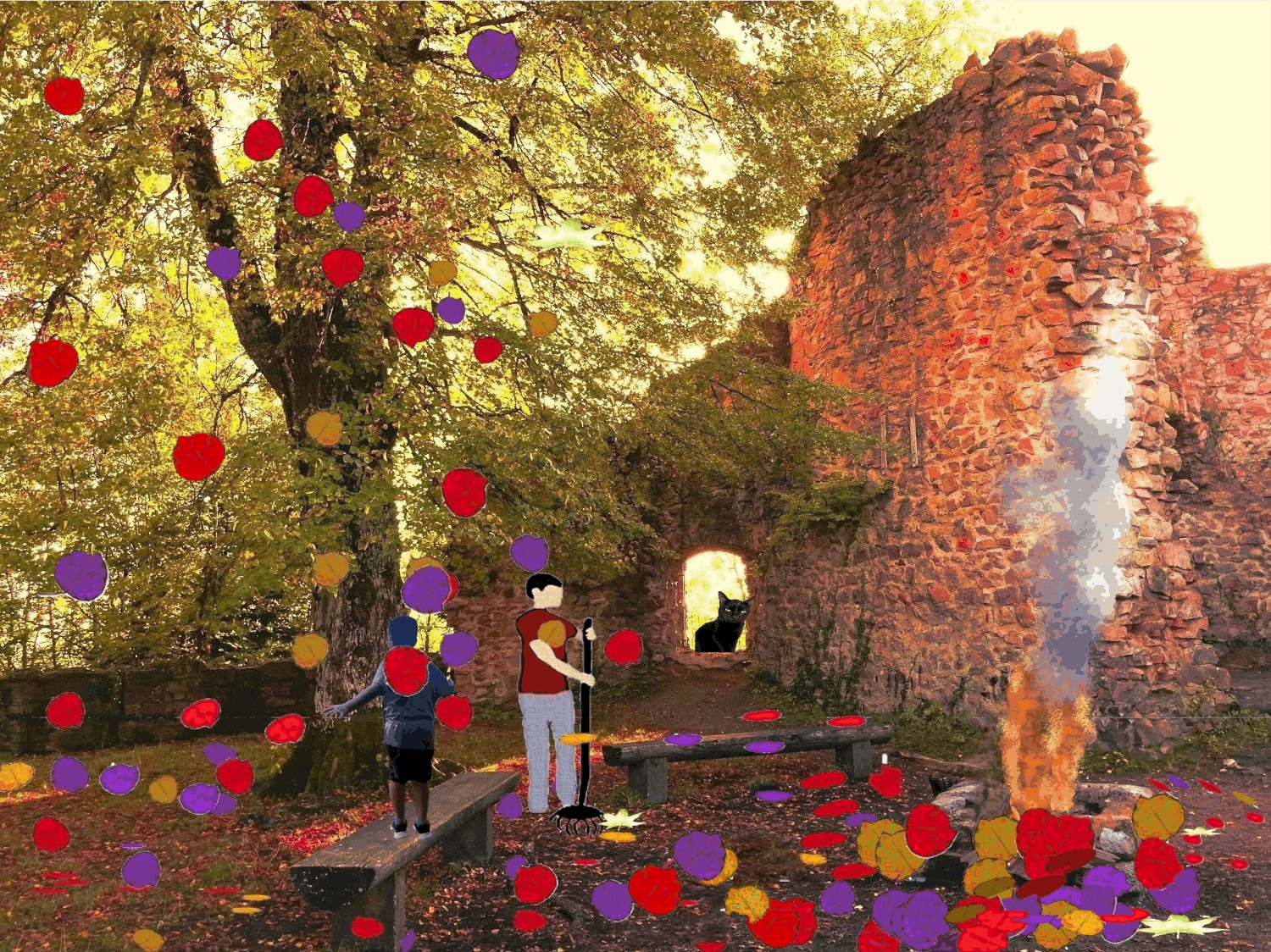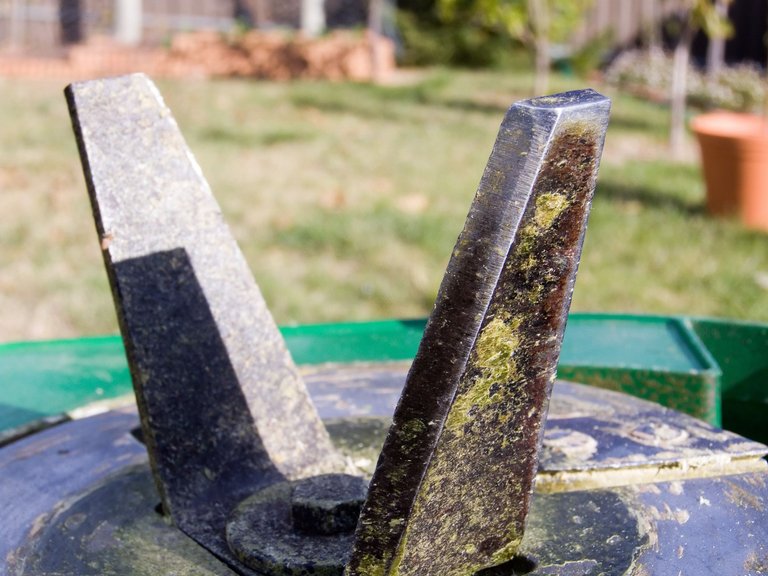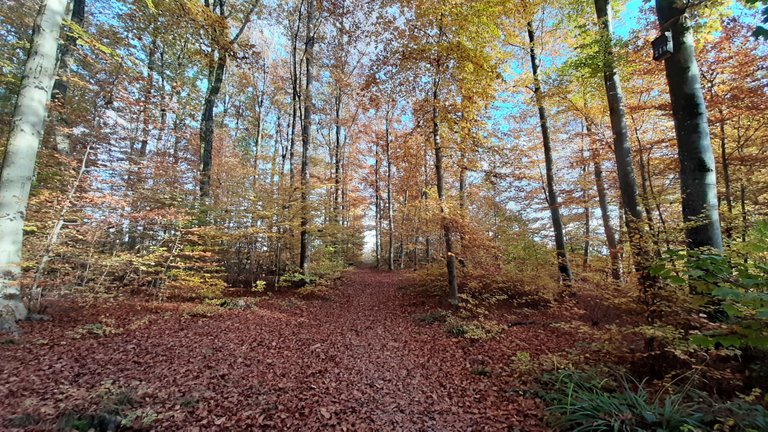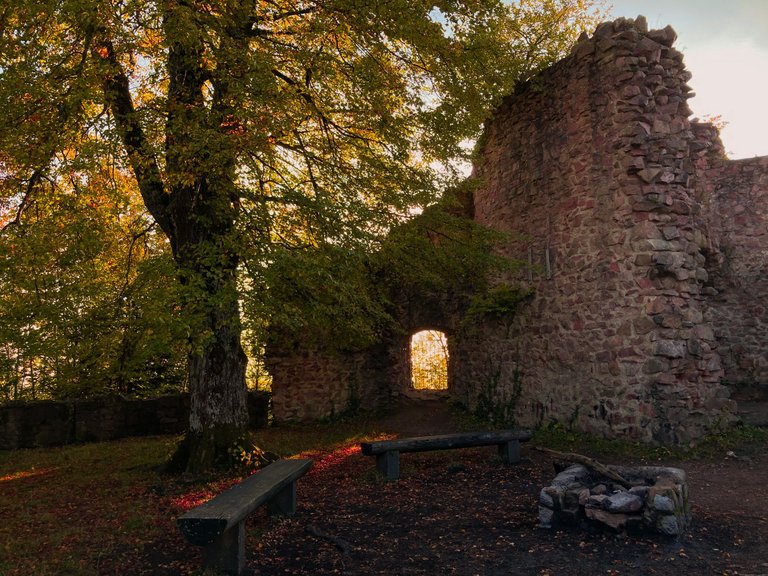Stop Raking Please: A Collage for LMAC #97

Do you live in a home that has a lawn, as I do? Have you ever thought that maybe lawns are not part of nature's plan? How can lawns be natural if they require fertilizer, edging, weed killing, copious watering and raking? Trees, however, shedding leaves at the end of summer is natural.
As shown in my collage, leaves will fall until the ground is blanketed. Should we be raking these? Is raking leaves good for the environment? According to John Sorochan, professor of turfgrass science at the University of Tennessee, the answer to that question is, "No."
Dr. Sorochan suggests, "Just leave them where they are and grind them up". Another academic, Dan Sandor, turfgrass scientist at the University of Minnesota, suggests that we mow over the leaves with a mulching blade once a week.
Garden Mulcher

Image credit: RainBoxRed. Used under a Licence Art Libre Copyleft: This work of art is free; you can redistribute it and/or modify it according to terms of the Free Art License. You will find a specimen of this license on the Copyleft Attitude site as well as on other sites.

Besides all the effort expended in raking leaves, there are other reasons to avoid this autumn ritual. An article published by the Chesapeake Bay Foundation lists several of these reasons.
1.Winter grass will love having shredded leaves as cover. From this the grass will derive nitrogen and organic material.
2.The leaf cover will protect root systems.
3.Moisture will be preserved under the crumbled leaves.
4.Chopping the leaves with a lawn mower, also cuts weeds. This will give winter grass more room to breathe.

Looking beyond our personal lawns, there are more compelling reasons for letting leaves stay on the ground and shredding them. Bagged yard debris contributes significantly to landfills. If the leaves are bagged in plastic, the harm is even greater.
Autumn in Sauvabelin

Image credit: P. Vensaus. Used under CC 4.0 license. Leaves are allowed to decompose gradually in a natural environment
The U. S. Environmental Protection Agency estimates that more than 6% of the waste in landfills comes from yard trimmings (which includes leaves). Not only do these bags of yard debris add to bursting landfills, but when the material breaks down with other landfill waste, methane gas is released. Methane gas, in the short term, has an even greater impact on climate (global warming) than carbon dioxide.

Nature sometimes is our best guide. Michael Potter, horticulture specialist writing in the Montgomery County Courier (Texas) sums it up. He describes the leaf cycle: "...Leaves drop and serve as mulch around trees...the mulch protects soil from crusting, erosion , and temperature extremes..." among other things. Eventually, leaf decomposition provides nutrients to the soil and these nutrients aid the growth of trees and plants.
My Collage
Shaka provided, as usual a really rich image for us to work with.

The invitation was to create a Halloween spectacular, but permission was granted to follow our imagination to wherever it took us. Mine took me to autumn, but not to Halloween.
I used the LIL library for several elements in my collage. The boy standing on the bench was contributed by @amilcar14. The cat in the window was contributed by @eve66. And the fire was contributed by @donroberts. The boy who is raking and all the leaves may also be found in #LIL. These I had contributed at different times.
Anyone can borrow from our gallery and anyone can contribute to it. Details may be found in this blog by @shaka.
If you haven't tried your hand at making a collage, join us. This is a personally rewarding experience and you might even win a prize. Although I don't compete in the contest, I join every week because it's so much fun. If you have any questions, you can contact us on Discord. We are friendly and welcome everyone.
Thank you @shaka for the fun. Thank you LMAC community for the community spirit.
Thank you for reading my blog. Hive on!


Very interesting words, I feel I have been here for a very long time even though I only joined a few weeks, here I found a lot of friendliness, and politeness, so that we who were beginners seemed to feel good so quickly, you are right I am here to find hospitality regardless level. Success always and I believe this is where I really belong.
I appreciate your kind words. Hive is a receptive place, especially if you network in the communities. I wish you good luck!
Awesome close-up, it looks like it's real, it works! :)
Thank you! I can't tell you how many times I had to make new frames and recreate the GIF. Leaves kept landing in all the wrong places :))
In the end, I got the look I was going for.
I appreciate your visit and your reblog.
Fantastic collage this week! I don’t really enjoy the scary part of Halloween, so this collage was very nice to see! Thanks for using my fire image!
High praise from a pro. Thank you! I have always loved Halloween, because I like to role play. Horror, however, never attracts me.
Thank you for your visit. Hope you had a great Halloween with your family.
Nice collage, I love the cat especially sitting in the window enjoying the falling leaves.
I have to admit to raking leaves... but only from the paths at the allotment as no one else does it and then I can hoard all the leaves for my leaf mulch pile... mwa ha ha ha. It is Halloween so I've been taken over by the spirit of a leaf stealing super villain! 🎃👻🎃
Happy Halloween @agmoore
Hello my friend. Thank you for the visit and the kind words. I live in the suburbs and everybody rakes, bags and sends the trash off. If you use the leaves for compost, that's great. When I was a child we didn't even own a rake. Leaves fell. Snow fell. The seasons changed. Even the grass was only cut when it got so long there might be snakes in it :)) Then we used a scythe to cut the grass, not a lawn mower. Didn't own a lawn mower either :)
Hope you are peaceful and feeling well, @raj808.
What a lovely peaceful collage A.G. The movement of the colorful leaves, rake, the smoke from the fire and the cat in the window are delightful.
You are so right about leaving the leaves on the yard. I mentioned this very topic in my last post on Autumn Leaves. Not only do they make great compost but it’s a winter home for insects and other little creatures so they can survive in the colder temperatures. Leaves could be mulched up in the spring if homeowners want to get rid of them.
My dear friend, @redheadpei, thank you for your visit. I'm so glad you like my peaceful collage. Yes, I relate to that child raking in a quiet place with only a cat for company. Kind of nice to imagine, isn't it?
I love it! You add to my next essay. Thank you. Hope you are enjoying the changing season. Fall is always a reminder, I think about the passing of time. Something sweetly nostalgic about it.
Thank you for the generous tip my friend.
Omg, I always love your meticulously created animations and your hand-drawn characters. :-) This one is so cleverly done and is a beautiful and a super cute result.
Watching the little man do his raking immediately put a happy smile on my face. When I see something like this, I could not resist to simply be happy.
There is a lot of effort, idea, concept and a wonderful spirit of creativity visible in your collage. For me, art works exactly like that. So, good job! :-)
When I was reading the title of the post and the first few of your lines, I thought, "what a great excuse to give my wife when she tells me to rake the leaves again.".
I finished reading your blog and now I'm about to realize it is not only a good excuse, but it really makes perfect sense.
Thanks for this interesting and fantastic edu-collage!
My friend @quantumg,
You are so good to me. Lifts my heart. Yes, there is a lot of work. Frames I messed that didn't jive. Leaves that stuck in the wrong place. But, always relaxing to concentrate on the little things. I think you and I have addressed this before. It's like a meditation. There is no goal except to complete the project.
My little drawing serves its purpose and you kindly allow it :) As for the raking! I always suspected but never knew exactly. My friend @redheadpei knows a lot about this. Her father used to be a forest ranger (or something like that) and he taught her about forests and trees and animals.
Please ask your wife if you can just chop up the leaves. I'll talk to my husband. I'll bet he is harder to persuade :))
Thanks again for your uplifting assessment.
Honestly, my words are truly product of my feeling while looking at your work. I wouldn't write things because I'm just trying to be nice. Because I'm nice anyway. :-D
But I know that from myself as well - I have always trouble accepting praise, too. :-)
Sometimes, the only way to convince men to do things differently is to buy us appropriate machines!!! ;-)
With a lot of talent and creativity you portray the end of summer, I love the animation you made with those falling leaves, the father cleaning and the cat watching. Another excellent job on your part. Best of luck in this round.
Thank you very much for your visit and for your kind assessment of my collage. It's hard to get everything working together. I'm glad it looks OK to my readers.
I don't enter the contest. My good luck comes in creating a collage. I love it, obviously.
Good luck to you!
Hello friend, how are you, excellent your collage and the information that you describe in your collage, this reminds me of a friend who told me that the leaves that fall on the ground of the trees were garbage, and he told me that it is not like a fertilizer that helps plants to grow, over time it becomes a product called compost.
Hello my friend, @cetb2008. I very much appreciate your visit and your kind words. I know you love nature and understand the rhythm of it. I think it's part of who you are.
Sometimes, if we just leave nature alone it will do the work necessary to see life thrive.
I hope you are well and enjoying change in weather.
Congratulations @agmoore! You have completed the following achievement on the Hive blockchain and have been rewarded with new badge(s) :
Your next target is to reach 18000 upvotes.
You can view your badges on your board and compare yourself to others in the Ranking
If you no longer want to receive notifications, reply to this comment with the word
STOPCheck out the last post from @hivebuzz:
Of course, Man had to come and meddle with nature and mess things up 😏
I learnt something new today though I have no lawn but if I did, it'd give me a reason not to do extra chores